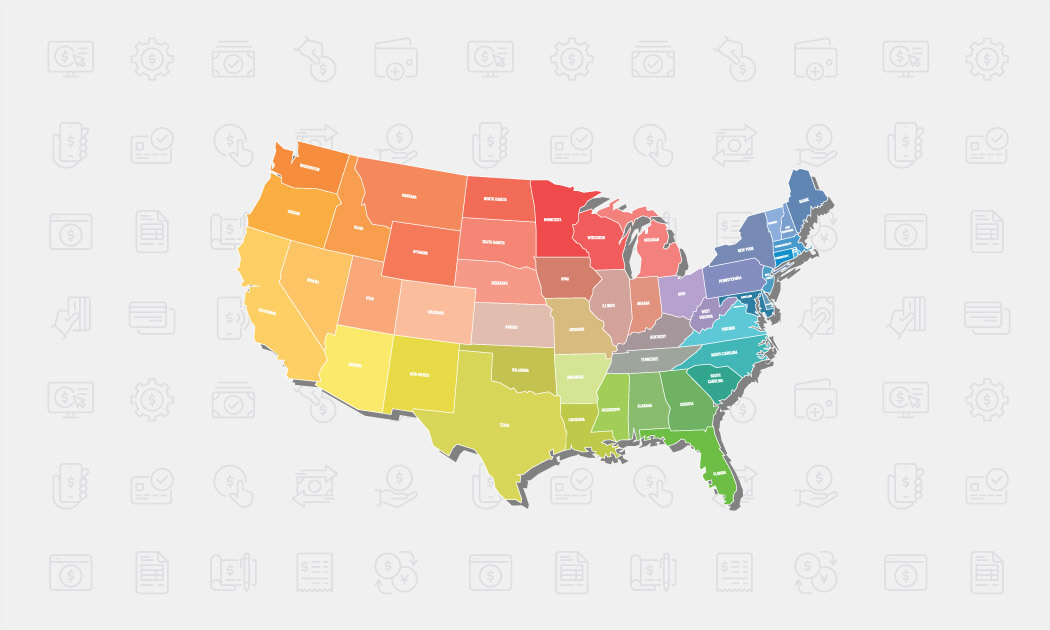Payroll Taxes, Wage, Hour, and Labor Laws by State
Payroll & Tax Information for Your State
All Fields Required
State Payroll, State Taxes, and State Unemployment
Select your state on the map below.
Payroll for small business owners is not a universal language. While you know your employees need to get paid properly and taxes must be filed, it’s hard to take advice from other small business owners since payroll rules and regulations differ depending on the state. For example, minimum wage rates, payroll schedules, unemployment policies, state reciprocity rules, and how you handle an employee’s final paycheck can vary widely from one state to another.
We’ve broken down the key things you need to know to tackle small business payroll in your state in the links below. But first, let’s dive into some general information all small business owners should be aware of no matter which state they’re in.
What is a State Tax ID?
A state tax ID is essentially another name for your employer identification number (EIN). An EIN is what you need to pay federal taxes, hire employees, and apply for any business loans.
If your small business also needs to pay state taxes, this may require a different number. Again, this varies by state, so you’ll want to check the rules for your state. This page on state and federal tax IDs from the U.S. Small Business Association is a good resource.
What is an Unemployment Tax ID?
If your small business has employees, then you are required for filing for unemployment insurance. Not only do the rules for acquiring an unemployment tax ID vary by state, but they also vary by business type. This means general business, non-profit, household, agricultural, government, or Indian tribes have different policies.
The best resource for understanding the requirements to obtain an unemployment tax ID in your state is looking at the rules set forth by the U.S. Department of Labor.
Should You File State Income Taxes?
When ranking your favorite seasons, we guess tax season isn’t at the top. In addition to filing federal income taxes, most business owners should also be filing a state income tax return.
Income rates range from zero to almost 13%. Yes, you read that right – some states don’t have income tax requirements! You’ll want to know the requirements for your state. Check out this list of state income tax rates that The Balance posted.
How Unemployment Changes by State
While the Federal Unemployment Tax Act (FUTA) must be paid regardless of where you’re located, it shouldn’t come as a surprise that each state also has its own State Unemployment Tax (SUTA) rules and regulations.
Every state has its own wage base, rates, and their own unemployment agency. If that isn’t complicated enough, these regulations are often changed year to year. Since SUTA is typically paid to the state an employee resides in, you may need to know the rules and regulations for multiple states depending on where your employees live.
How State Requirements Affect Payroll
Payroll is hard enough when you’re just following federal laws. But once you throw in state laws, payroll suddenly reaches new levels of complicated. Choosing an online payroll software to help you out can be an excellent decision.
At SurePayroll we stay on top of all federal, state, and local tax codes to ensure your small business is always compliant. Some states have more complex tax requirements at the jurisdiction level, and we work hard to help small business owners navigate those tax complexities. In fact, we support over 6,000 active taxes across the U.S.
Taxes, Unemployment, Wage, and Hour Laws by State
To better understand the requirements for your state, learn more in the table below.
Alaska
Arizona
Arkansas
California
Colorado
Connecticut
Delaware
District of Columbia
Florida
Georgia
Hawaii
Idaho
Illinois
Iowa
Kansas
Kentucky
Louisiana
Maine
Maryland
Massachusetts
Michigan
Minnesota
Mississippi
Missouri
Montana
Nebraska
Nevada

